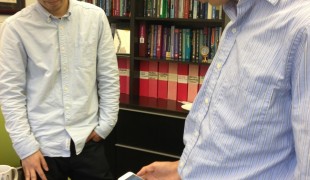- 6180
- 407
- 11
- 16
- 0
- Help Ukraine
About the solution
14-year-old Freddie has been creating devices to help his great-aunt Pat, who suffers from dementia. Freddie developed an interest in engeneering at an early age, as he explains “So, I joined a code club in my primary school, in year for or five, and I learnt coding through there and I’ve loved coding ever since”.
One of the problems that most concerned Freddie about his great-aunt was the frequent falling. “We’d realized the my great-aunt Pat would fall but then forget to press her button so she’d be found several hours later by her carers.” So, he created a system that is able to detect when she falls
The first component is the Fall Alert, a wearable sensor that detects when the person falls and sends an alert to the family. The system them activates a small robot – Fallbot - that goes around the house to look for the fallen person. Fallbot can detect and avoid obstacles and can be remotely controlled through a videofeed. It also has a camera so family members can see whether the person is okay or is in need of assistance.
Freddie entered his Fall Alert system into the 2020 UK’s Big Bang competition and won the prize for Junior Engineer of the Year.
Adapted from: https://youtu.be/oegm1OlIi3M
This solution shall not include mention to the use of drugs, chemicals or biologicals (including food); invasive devices; offensive, commercial or inherently dangerous content. This solution was not medically validated. Proceed with caution! If you have any doubts, please consult with a health professional.
DISCLAIMER: This story was written by someone who is not the author of the solution, therefore please be advised that, although it was written with the utmost respect for the innovation and the innovator, there can be some incorrect statements. If you find any errors please contact the patient Innovation team via info@patient-innovation.com
-
-
1012
-
0
-
21744

Boy invents device to send an alert when a patient get out of bed, inspired by his grandfather
STANDING UP: Standing up from a seated position
SLEEP FUNCTION: Resting
CAREGIVING
Alzheimer's Disease
App (Including when connected with wearable)
Body-Worn solutions (Clothing, accessories, shoes, sensors...)
Assistive Daily Life Device (to help ADL)
AI algorithm
Difficulty coordinating movements
Muscle weakness
Loss of balance
Trouble with fine motor skills (e.g., writing, buttoning clothes)
Memory loss
Sleep disturbances
Sensory disturbances (e.g., hypersensitivity to touch, temperature changes)
Dizziness or lightheadedness
Managing Neurological Disorders
Preventing (Vaccination, Protection, Falls, Research/Mapping)
Caregiving Support
Internal Medicine
Neurology
United States
-
-
-
397
-
0
-
4731

Collaborator Pierluigi Mantovani creates Evolution Devices - solutions that aim to transform Multiple Sclerosis Management
CAREGIVING
BODY BALANCE: Maintaining body balance
STANDING UP: Standing up from a seated position
WALKING: Walking
Multiple Sclerosis
Assistive Daily Life Device (to help ADL)
Walking Aid (wheelchair/walker/crutches)
App (Including when connected with wearable)
AI algorithm
Body-Worn solutions (Clothing, accessories, shoes, sensors...)
Restoring mobility
Regaining sensory function
Managing pain
Promoting self-management
Preserving Organ Function
Managing Neurological Disorders
Maintaining Balance and Mobility
To improve Treatment/Therapy
Preventing (Vaccination, Protection, Falls, Research/Mapping)
Raise awareness
Caregiving Support
General and Family Medicine
Internal Medicine
Medical Genetics
Neurology
Physical Medicine and Rehabilitation
United States
-
-
-
828
-
0
-
17963

Proloquo2Go – App to help people communicate
CAREGIVING
COMMUNICATION: Communicating, whether by speaking, listening, or other means
Social interaction
Paralysis
Autism
Cerebral Palsy
Brain Stroke
Brain Injury (Abscess, Brain Barrier Defect, Brain Contusion, Brain Hemorrhage, Brain Edema)
Assistive Daily Life Device (to help ADL)
Assistive Technology access
App (Including when connected with wearable)
Tremors
Muscle cramps or spasms
Difficulty coordinating movements
Muscle weakness
Difficulty speaking or understanding speech
Trouble with fine motor skills (e.g., writing, buttoning clothes)
Twitching or involuntary movements (myoclonus)
Acquired language impairment (Aphasia)
Promoting self-management
Managing Neurological Disorders
Building Supportive Community Relationships
Promoting inclusivity and social integration
Improving Speech and Communication
Caregiving Support
Clinical Pathology
Medical Genetics
Neurology
Pediatrics
Rheumatology
Netherlands
-
 en
en